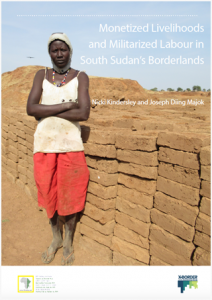Northern Bahr el-Ghazal, like much of South Sudan, is in a protracted state of social and economic crisis, rooted in generations of armed conflict, forced resettlements, and a shift towards a cash and market economy. Since the 1980s, family units and livelihoods have been destroyed, displaced or reworked by conflict and most people have been forced to engage in precarious work for survival. Many residents have been drawn into patterns of labour migration to Sudan, trade and markets in often dependent or exploitative relationships, which have built on much older histories of conscription and enslavement. Political-economic systems have developed that exploit these processes of commodification, labour exploitation and basic insecurity.
The report uses the concepts of stress, risk and precarity as a frame of reference for understanding the fragmented and contingent futures that people in the borderland are navigating. What choices and possibilities do people have for self-development? How are these opportunities controlled and manipulated, and by whom? Who is trapped into being simply resilient and who can seek opportunity and challenge the terms of this often coercive and dangerous economy?
The report is a product of the X-Border Local Research Network, a component of DFID’s Cross-border Conflict—Evidence, Policy and Trends (XCEPT) programme. The programme carries out research work to better understand the causes and impacts of conflict in border areas and their international dimensions. It supports more effective policymaking and development programming and builds the skills of local partners. The report was written by Dr Nicki Kindersley and Joseph Diing Majok.




